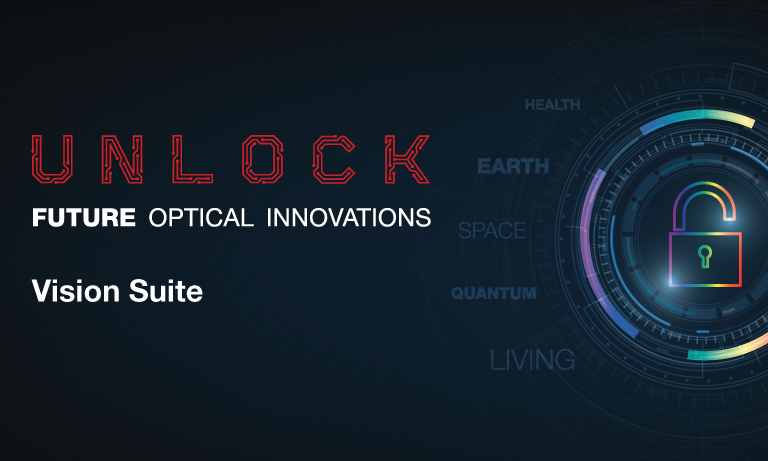United States (EN)
Select your region or country.


When and where:
January 30, 2024 • 11 AM to 5 PM | January 31, 2024 • 10 AM to 5 PM | February 1, 2024 • 11 AM to 1 PM
The Moscone Center, Room 111 (North Lobby)
Vision Suite: A glimpse into the world of future photonics
Photonics West 2024 is around the corner and as we prepare for the event, we have an exciting news. We will have a separate exhibit in addition to our main booth #1127. It will be dedicated to showcase our innovative optical technologies in selected markets to give the attendees a preview of what’s to come in the future of photonics.
Once every 5 years, Hamamatsu Photonics in Japan presents Photon Fair where our technological advancements and capabilities in photonics are demonstrated in a dynamic and futuristic setting. We are bringing the essence of Photon Fair to our Vision Suite at Photonics West 2024. The Vision Suite is located in room Room 111 at the North Lobby across from the South Hall where our main booth 1127 is.

Although it's on a smaller scale, our Vision Suite is designed to showcase a curated selection of technologies, applications, and research from the Photon Fair to demonstrate the potential and possibilities of photonics in the years to come. With a blend of interactive demos and presentations guided by our knowledgeable staff, the experience aims to inspire attendees and spark their imagination about what’s possible in the future of photonics.
Imagine the possibilities with our core technologies

Photonics is poised to revolutionize various aspects of our daily existence. Advanced optical technologies are integral to high-speed internet connections, making streaming, communication, and remote work seamless. In our homes, optical sensors enhance our comfort and reduce energy consumption. Photonics also enables augmented reality and virtual reality experiences, enhancing entertainment, education, and training. Moreover, in transportation, optical sensors and LiDAR systems are making vehicles safer and more autonomous. As photonics innovations continue, they will further integrate into our daily routines enabling well-being, mind, earth, everyday living, quantum technology and space -- making our lives more efficient, healthier, enjoyable, and connected.

Well-being
Photonics is positioned to significantly enhance our overall well-being and health. It underpins a wide range of medical technologies, from advanced imaging systems for early disease diagnosis to precise laser-based treatments for various conditions. Photonics technology is transforming point-of-care diagnostics and continuous health monitoring, facilitating swift and accurate medical testing at the bedside and the development of innovative health wearable technologies, all achieved through advanced light-based sensing and imaging techniques. Furthermore, photonics facilitates breakthroughs in pharmaceutical research, drug delivery, and personalized medicine, improving treatment efficacy. As photonics innovations continue to flourish, our well-being and healthcare will benefit from safer, more accessible, and efficient technologies, ultimately leading to healthier lives for individuals and communities.

Mind
Photonics holds the potential to revolutionize our understanding of the mind and brain. Its applications in neural imaging and optogenetics enable precise and non-invasive observation and manipulation of neural activities. Advanced photonics tools are helping researchers map and explore the brain's intricate circuitry, shedding light on neurobiology and cognitive functions. Additionally, optical technologies offer promising solutions for brain-computer interfaces, allowing for direct communication between the brain and external devices, with potential applications in healthcare, prosthetics, and human-computer interaction. As photonics continues to advance, it will play a pivotal role in unlocking the mysteries of the mind and developing transformative brain-related technologies that can enhance our understanding, well-being, and cognitive abilities.

Earth
Photonic technology is proving instrumental in the global efforts to mitigate pollution across air, water, land, and recycling processes. In air quality monitoring, advanced optical sensors and spectroscopy techniques enable real-time detection of pollutants, allowing for swift response and better regulation. Photonics-based water purification systems leverage precise light-based methods to target contaminants, offering efficient and environmentally friendly solutions for ensuring clean water supplies. In land pollution management, photonics aids in the development of sophisticated imaging and sensing technologies that facilitate early detection and monitoring of waste disposal issues. Additionally, in recycling processes, photonics contributes to sorting and separation methods, enhancing the efficiency of recycling facilities. The integration of photonic technology across these domains underscores its pivotal role in developing innovative solutions for pollution reduction and promoting a more sustainable and cleaner environment.

Everyday living
Photonics is integral to semiconductor processes, enhancing manufacturing precision. It also plays a key role in battery inspection, utilizing light-based sensors to ensure the quality of battery cells and optimize energy storage. In the realm of smart home and smart city technologies, photonics enables automation through LiDAR sensors and optical communication networks, contributing to the navigation of autonomous vehicles and forming the backbone of interconnected smart systems. In industrial automation, photonics is applied in quality control, laser-based manufacturing, and precision sensing. Additionally, the industrial automation trend powered by photonics represents a shift towards intelligent, connected, and adaptive manufacturing ecosystems, transcending mere operational streamlining.

Quantum technology
Photonics is poised to play a pivotal role in shaping the future of quantum technologies. With its unique ability to control and manipulate individual particles of light, or photons, photonics enables the development of quantum systems for communication, computation, and sensing. Photonic quantum technologies are at the forefront of secure quantum communication, such as quantum key distribution, and are crucial for realizing quantum computing platforms. Moreover, photonics provides essential components for quantum sensors, enhancing precision in fields like quantum metrology and quantum imaging. As quantum technologies continue to advance, photonics will remain an indispensable tool, propelling us into a future where quantum effects are harnessed for unprecedented advancements in science and technology.

Space
Photonics is essential in shaping the future of space exploration and communication. Leveraging the capabilities of light, photonics facilitates the creation of advanced optical systems essential for both space missions and ground-based initiatives aimed at unraveling the mysteries of our universe. It is instrumental in enhancing our comprehension of the origins and unique phenomena that define our cosmic surroundings. Furthermore, photonics is a key player in propelling the frontiers of space exploration, contributing significantly to our profound understanding of the universe. In the realm of astronomy, the integration of large telescopes empowered by CCD image sensors and cameras has proven invaluable. These technologies enable the observation of exoplanets, protoplanetary systems, and the quest for signs of extraterrestrial life. Additionally, they play a crucial role in investigating the nature of dark energy through direct measurements of the universe's expansion. Spectroscopy, a photonics-driven methodology, empowers scientists to scrutinize the composition and properties of distant stars, galaxies, and other cosmic entities by analyzing their light spectra. Photonics technology, such as Photomultiplier Tubes (PMTs), excels in low-light conditions and finds application in space instruments dedicated to detecting faint celestial signals. As we march into the future, various photonics technologies will undoubtedly continue to be indispensable, playing essential roles in augmenting our capabilities for space exploration and observation.
- Confirmation
-
It looks like you're in the . If this is not your location, please select the correct region or country below.
You're headed to Hamamatsu Photonics website for US (English). If you want to view an other country's site, the optimized information will be provided by selecting options below.
In order to use this website comfortably, we use cookies. For cookie details please see our cookie policy.
- Cookie Policy
-
This website or its third-party tools use cookies, which are necessary to its functioning and required to achieve the purposes illustrated in this cookie policy. By closing the cookie warning banner, scrolling the page, clicking a link or continuing to browse otherwise, you agree to the use of cookies.
Hamamatsu uses cookies in order to enhance your experience on our website and ensure that our website functions.
You can visit this page at any time to learn more about cookies, get the most up to date information on how we use cookies and manage your cookie settings. We will not use cookies for any purpose other than the ones stated, but please note that we reserve the right to update our cookies.
1. What are cookies?
For modern websites to work according to visitor’s expectations, they need to collect certain basic information about visitors. To do this, a site will create small text files which are placed on visitor’s devices (computer or mobile) - these files are known as cookies when you access a website. Cookies are used in order to make websites function and work efficiently. Cookies are uniquely assigned to each visitor and can only be read by a web server in the domain that issued the cookie to the visitor. Cookies cannot be used to run programs or deliver viruses to a visitor’s device.
Cookies do various jobs which make the visitor’s experience of the internet much smoother and more interactive. For instance, cookies are used to remember the visitor’s preferences on sites they visit often, to remember language preference and to help navigate between pages more efficiently. Much, though not all, of the data collected is anonymous, though some of it is designed to detect browsing patterns and approximate geographical location to improve the visitor experience.
Certain type of cookies may require the data subject’s consent before storing them on the computer.
2. What are the different types of cookies?
This website uses two types of cookies:
- First party cookies. For our website, the first party cookies are controlled and maintained by Hamamatsu. No other parties have access to these cookies.
- Third party cookies. These cookies are implemented by organizations outside Hamamatsu. We do not have access to the data in these cookies, but we use these cookies to improve the overall website experience.
3. How do we use cookies?
This website uses cookies for following purposes:
- Certain cookies are necessary for our website to function. These are strictly necessary cookies and are required to enable website access, support navigation or provide relevant content. These cookies direct you to the correct region or country, and support security and ecommerce. Strictly necessary cookies also enforce your privacy preferences. Without these strictly necessary cookies, much of our website will not function.
- Analytics cookies are used to track website usage. This data enables us to improve our website usability, performance and website administration. In our analytics cookies, we do not store any personal identifying information.
- Functionality cookies. These are used to recognize you when you return to our website. This enables us to personalize our content for you, greet you by name and remember your preferences (for example, your choice of language or region).
- These cookies record your visit to our website, the pages you have visited and the links you have followed. We will use this information to make our website and the advertising displayed on it more relevant to your interests. We may also share this information with third parties for this purpose.
Cookies help us help you. Through the use of cookies, we learn what is important to our visitors and we develop and enhance website content and functionality to support your experience. Much of our website can be accessed if cookies are disabled, however certain website functions may not work. And, we believe your current and future visits will be enhanced if cookies are enabled.
4. Which cookies do we use?
There are two ways to manage cookie preferences.
- You can set your cookie preferences on your device or in your browser.
- You can set your cookie preferences at the website level.
If you don’t want to receive cookies, you can modify your browser so that it notifies you when cookies are sent to it or you can refuse cookies altogether. You can also delete cookies that have already been set.
If you wish to restrict or block web browser cookies which are set on your device then you can do this through your browser settings; the Help function within your browser should tell you how. Alternatively, you may wish to visit www.aboutcookies.org, which contains comprehensive information on how to do this on a wide variety of desktop browsers.
5. What are Internet tags and how do we use them with cookies?
Occasionally, we may use internet tags (also known as action tags, single-pixel GIFs, clear GIFs, invisible GIFs and 1-by-1 GIFs) at this site and may deploy these tags/cookies through a third-party advertising partner or a web analytical service partner which may be located and store the respective information (including your IP-address) in a foreign country. These tags/cookies are placed on both online advertisements that bring users to this site and on different pages of this site. We use this technology to measure the visitors' responses to our sites and the effectiveness of our advertising campaigns (including how many times a page is opened and which information is consulted) as well as to evaluate your use of this website. The third-party partner or the web analytical service partner may be able to collect data about visitors to our and other sites because of these internet tags/cookies, may compose reports regarding the website’s activity for us and may provide further services which are related to the use of the website and the internet. They may provide such information to other parties if there is a legal requirement that they do so, or if they hire the other parties to process information on their behalf.
If you would like more information about web tags and cookies associated with on-line advertising or to opt-out of third-party collection of this information, please visit the Network Advertising Initiative website http://www.networkadvertising.org.
6. Analytics and Advertisement Cookies
We use third-party cookies (such as Google Analytics) to track visitors on our website, to get reports about how visitors use the website and to inform, optimize and serve ads based on someone's past visits to our website.
You may opt-out of Google Analytics cookies by the websites provided by Google:
https://tools.google.com/dlpage/gaoptout?hl=en
As provided in this Privacy Policy (Article 5), you can learn more about opt-out cookies by the website provided by Network Advertising Initiative:
http://www.networkadvertising.org
We inform you that in such case you will not be able to wholly use all functions of our website.
Close